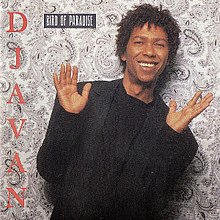Bird of Paradise (album)
| Bird of Paradise | ||||
|---|---|---|---|---|
 | ||||
| Studio album by | ||||
| Released | 1988 | |||
| Genre | Samba | |||
| Label | Columbia | |||
| Producer | Ronnie Foster | |||
| Djavan chronology | ||||
| ||||
Bird of Paradise is an album by the Brazilian musician Djavan.[1][2] It was released in 1988 via Columbia Records, part of a Brazilian push by the label that also included albums by Milton Nascimento (Yauaretê) and Simone (Vicio).[3][4]
Production[edit]
The album was produced by Ronnie Foster.[5] Three of its songs are sung in English; Djavan had others write the lyrics to them.[6] Djavan recorded the album in Los Angeles, using session musicians.[7]
"Stephen's Kingdom", to which Stevie Wonder contributed, is about the South African township of Soweto.[8][9]
Critical reception[edit]
| Review scores | |
|---|---|
| Source | Rating |
| AllMusic | |
| The Encyclopedia of Popular Music | |
| MusicHound World: The Essential Album Guide | |
| The Rolling Stone Album Guide | |
The Sun Sentinel wrote that Djavan's "voice is a clear, strong, masculine baritone, his guitar distinctly grounded in but not enslaved to the samba beat, the melodies are long, lilting, undulating lines rising above a plush, complex harmonic carpet."[13] The Boston Globe thought that "Djavan's upbeat Anglo-Brazilian pop will appeal to West Coast jazz fusion fans as well as pop listeners."[14]
The Washington Post determined that, "as slick and predictable as it is, though, the album is redeemed by a few of Djavan's lyrics, including the compulsive love song 'Madness' and the temptress tale 'Miss Susanna'."[5] The New York Times concluded that, "as a singer, Djavan doesn't have the angelic, impeccable intonation of Mr. Nascimento or Mr. [Caetano] Veloso; he sounds a little more fallible and earthly, perhaps more approachable for American pop listeners."[15] The Philadelphia Inquirer deemed the album "predictable, Westernized funk."[16]
AllMusic called the album "full of strong, haunting, lusciously melodic songs often backed by that gently jumping, uplifting rhythm that runs through much of his material."[10]
Track listing[edit]
| No. | Title | Length |
|---|---|---|
| 1. | "Carnaval in Rio (Carnaval no Rio)" | |
| 2. | "Bird of Paradise" | |
| 3. | "Apple (Maçã)" | |
| 4. | "Real" | |
| 5. | "Madness (Doidice)" | |
| 6. | "Stephen's Kingdom" | |
| 7. | "Bouquet" | |
| 8. | "Take Me (Me Leve)" | |
| 9. | "I Will, I Won't (Dou-Não-Dou)" | |
| 10. | "Miss Susanna" |
References[edit]
- ^ McGowan, Chris; Pessanha, Ricardo (December 20, 1998). The Brazilian Sound: Samba, Bossa Nova, and the Popular Music of Brazil. Temple University Press. ISBN 9781566395458.
- ^ "As Brazilian pop...". USA Today. 30 June 1988. p. 1D.
- ^ "Djavan Biography, Songs, & Albums". AllMusic.
- ^ Casuso, Jorge (31 July 1988). "A Touch of Jazz from Brazil". Arts. Chicago Tribune. p. 27.
- ^ a b Joyce, Mike (22 July 1988). "Boss Nuova Music: Best of New Brazil". The Washington Post. p. N21.
- ^ Duncan, Amy (31 Aug 1988). "A major Brazilian star reaches out to the US". Arts. The Christian Science Monitor.
- ^ Stewart, Zan (17 Sep 1988). "Brazil's Djavan Would Like to Sing to the World". Calendar. Los Angeles Times. p. 2.
- ^ a b Larkin, Colin (2006). The Encyclopedia of Popular Music. Vol. 3. MUZE. p. 48.
- ^ Nix, Phyllis (Nov 1988). "The Sound of Brazil". The Crisis. p. 8.
- ^ a b "Bird of Paradise". AllMusic.
- ^ MusicHound World: The Essential Album Guide. Visible Ink Press. 2000. p. 223.
- ^ The Rolling Stone Album Guide. Random House. 1992. p. 203.
- ^ Ginell, Richard S. (23 Sep 1988). "Djavan Lets Brazilian Sound Soar on Own Merits". Features Showtime. Sun Sentinel. p. 18.
- ^ Gonzalez, Fernando (14 Aug 1988). "Time Is Now for Brazilian Music". The Boston Globe. p. A4.
- ^ Pareles, Jon (25 Sep 1988). "A Brazilian-American Cultural Exchange". The New York Times. p. A64.
- ^ Moon, Tom (21 Oct 1989). "Brazil's Djavan Brings Conflicting Styles to U.S.". The Philadelphia Inquirer. p. D5.
